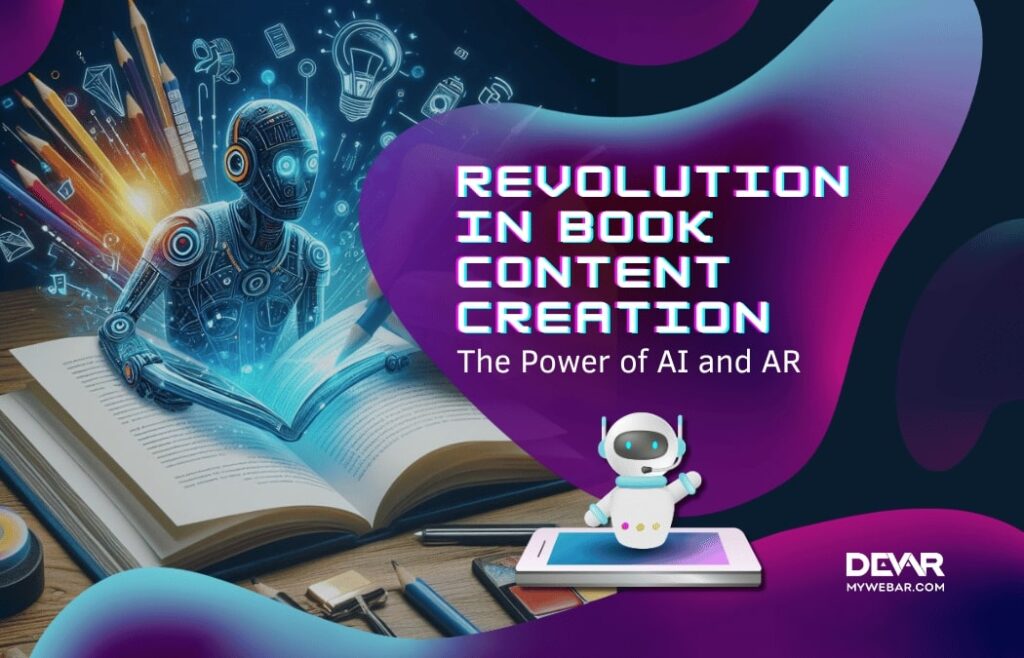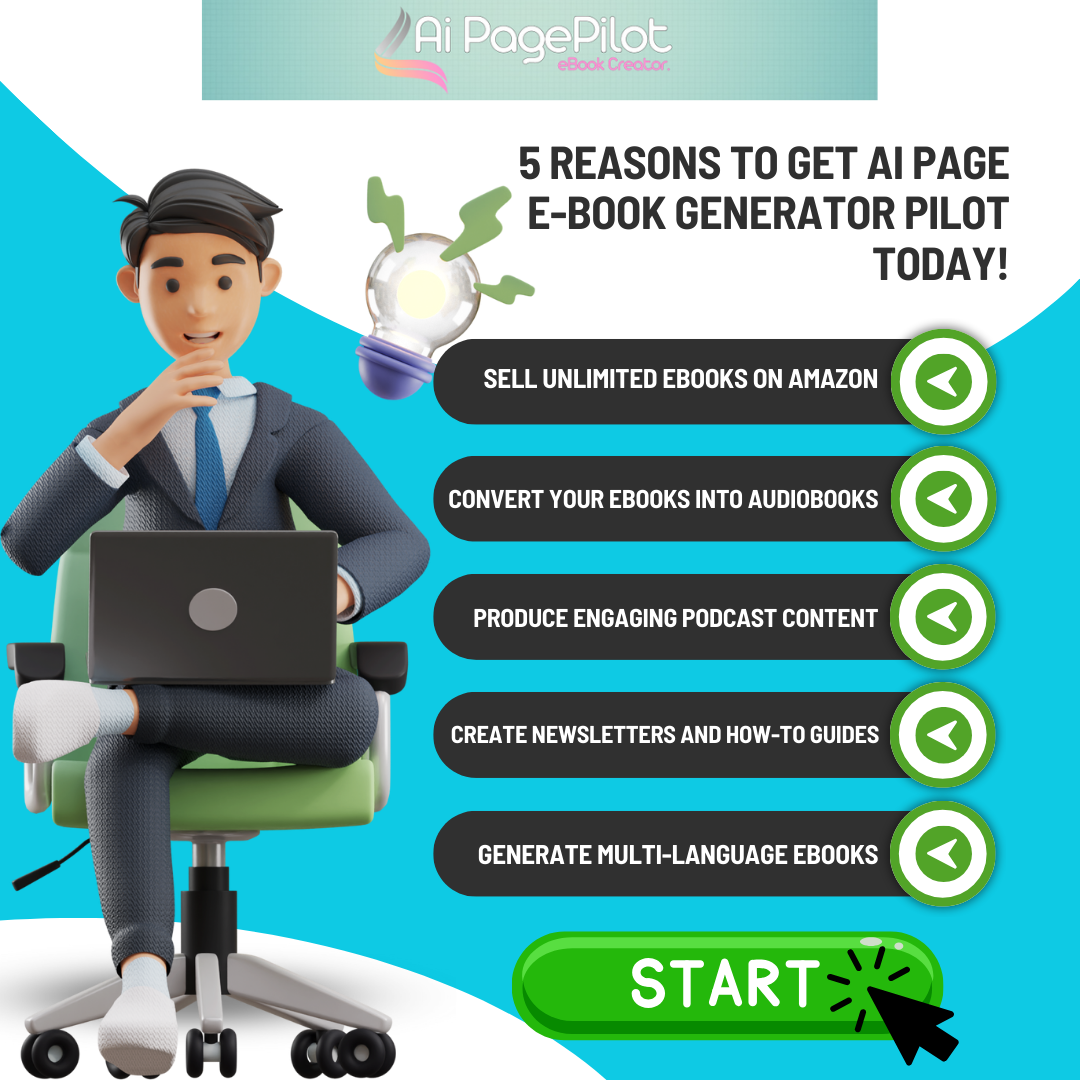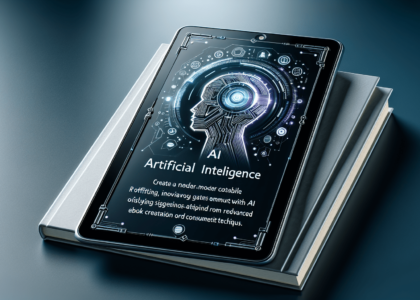Imagine a world where creating ebooks is as simple as a few clicks of a button. The future of AI content for ebook creation holds immense potential, offering individuals the ability to effortlessly generate unique and engaging content for their publications. With advancements in artificial intelligence technology, platforms like AI PagePilot ebook Creator are revolutionizing the way ebooks are produced. From providing opportunities to make money with AI ebooks to offering an AI ebook creator that streamlines the entire process, the future of AI content for ebook creation is a promising one.
Advancements in AI Technology
Artificial Intelligence (AI) has made significant progress in recent years, particularly in the field of natural language processing. This is the branch of AI that focuses on enabling computers to understand and interpret human language. Through the use of machine learning algorithms, computers are able to analyze and process vast amounts of text, allowing for more advanced and sophisticated interactions between humans and machines.
Machine learning is another area where AI has seen tremendous advancements. In simple terms, machine learning refers to the ability of computers to learn and improve from experience. By training algorithms with large sets of data, machines can make predictions, identify patterns, and perform complex tasks without being explicitly programmed to do so.
Deep learning, a subset of machine learning, has also played a critical role in advancing AI technology. It involves the construction of artificial neural networks that mimic the structure and function of the human brain. This enables machines to process and analyze information in a manner that is similar to how humans do. As a result, deep learning algorithms can recognize patterns and make decisions with a high level of accuracy.
Image recognition is another area where AI has made significant strides. By leveraging deep learning techniques, computers can accurately identify and classify objects within images. This has numerous applications, such as in the field of healthcare, where AI-powered image recognition can aid in the diagnosis of diseases and the detection of abnormalities.
Benefits of AI Content for Ebook Creation
The use of AI in ebook creation offers numerous benefits that can enhance the overall process and quality of content.
One major advantage is the efficiency and speed that AI brings to the table. With AI-powered content creation tools, authors and publishers can automate various tasks, such as writing summaries, generating keywords, and proofreading. This allows for faster production of ebooks, saving both time and effort.
Consistency and accuracy are also key benefits of using AI in ebook creation. Unlike humans, AI-powered systems are not prone to fatigue, distractions, or errors. They can consistently produce high-quality content without the risk of typos or grammatical mistakes. This ensures a consistent reading experience for the audience.
Personalization and customization are two other benefits of AI-generated content for ebooks. By analyzing reader data, AI algorithms can tailor the content to suit the preferences and interests of individual readers. This level of personalization not only enhances the reading experience but also increases reader engagement and satisfaction.
Cost reduction is yet another advantage of AI content for ebook creation. By automating certain tasks, publishers can significantly reduce their production costs. This is particularly beneficial for self-published authors or small publishing houses that may have limited resources.

Challenges of AI Content for Ebook Creation
While AI content creation offers numerous benefits, there are also challenges that need to be overcome.
One of the main challenges is quality control. Although AI algorithms have improved significantly, they are still not on par with human creativity and intuition. Ensuring that AI-generated content meets high standards of quality and readability remains a challenge for the industry.
Ethical concerns surrounding AI-generated content are also an issue that needs to be addressed. Plagiarism and copyright infringement are potential risks associated with AI-powered content creation tools. It is important to establish guidelines and best practices to ensure ethical content creation.
Another challenge is the lack of creativity in AI-generated content. While machines can mimic human writing styles, they often struggle to produce original and imaginative content. This limitation hinders the ability to create truly unique and engaging ebooks.
AI content creation is heavily reliant on data. This dependency can become a challenge when there is a lack of relevant and high-quality data. Without sufficient data, AI algorithms may struggle to generate accurate and meaningful content.
AI Ebook Creation Tools
There are several AI-powered ebook creation tools available in the market today that can assist authors and publishers in creating engaging content.
One such tool is the AI PagePilot Ebook Creator. This platform combines natural language processing and machine learning algorithms to automate the creation of ebooks. It offers features such as content generation, formatting, and even cover design. Users can input their desired content and let the AI do the rest, resulting in a professionally formatted ebook.
In addition to AI PagePilot, there are various other AI ebook creation platforms available. Some offer more advanced features such as real-time editing and collaboration, while others focus on specific genres or niches. It is important to explore and compare different options to find the tool that best suits your needs and preferences.

AI-Generated Content in Ebook Publishing Industry
The integration of AI-generated content in the ebook publishing industry has brought about significant changes and opportunities.
One major advantage is increased accessibility. AI-powered tools have made it easier for authors to create and distribute their work in ebook format. This has democratized the publishing process, allowing more aspiring authors to share their stories with a wider audience.
AI-generated content has also contributed to the expansion of the ebook market. With the ability to create ebooks more efficiently and at a lower cost, publishers can release a greater variety of titles to cater to diverse reader interests. This has led to a more diverse and inclusive ebook market.
The reader experience has been transformed by AI-generated content. Through personalization algorithms, readers can now discover books that are tailored to their preferences and interests. This has not only improved the reading experience but has also increased reader engagement and satisfaction.
AI has also improved the publishing workflow. With automated content creation and formatting, publishers can streamline the production process, reducing the time and resources required to bring a book to market. This has resulted in a more efficient and cost-effective publishing industry.
AI Content vs. Human Content
Both AI and human-generated content have their own unique strengths and advantages.
AI content offers certain benefits that human content may not be able to match. For example, AI content creation tools can produce content at a much faster rate than humans. They can also analyze vast amounts of data and identify patterns that humans may miss. This allows for more comprehensive and data-driven content.
On the other hand, human-generated content has qualities that AI content may struggle to replicate. Humans possess creativity, intuition, and emotional intelligence, which are often missing in AI-generated content. Human content can resonate with readers on a deeper level, evoking emotions and personal connections that AI content may lack.
Finding the right balance between AI and human content is essential. While AI can assist in content creation and streamline processes, human input is necessary to add a personal touch and ensure originality. A combination of both AI and human content can result in a more comprehensive and engaging ebook.

The Role of AI in Content Research and Analysis
AI has revolutionized content research and analysis by automating various tasks and providing valuable insights.
Automated data gathering is one area where AI has made a significant impact. AI algorithms can crawl the web, gather relevant information, and analyze it to extract key insights. This saves researchers considerable time and effort, allowing them to focus on more complex analysis and interpretation.
Semantic analysis is another crucial role that AI plays in content research. By analyzing the meaning and context of words and phrases, AI algorithms can determine the sentiment and tone of content. This helps researchers identify trends, opinions, and patterns within large datasets.
Trend identification is yet another valuable application of AI in content research. By analyzing massive amounts of data, AI algorithms can identify emerging trends and topics of interest. This allows publishers and authors to stay ahead of the curve, providing readers with timely and relevant content.
Ethical Considerations in AI-Generated Content
As AI-generated content becomes more prevalent, ethical considerations need to be carefully addressed.
One of the main concerns is copyright and plagiarism. AI content creation tools have the potential to generate content that may infringe upon existing copyright laws. It is crucial for AI platforms and users to ensure that they have the right to use the content generated and to respect the intellectual property rights of others.
Authenticity and bias are also important ethical considerations. AI algorithms can inadvertently introduce biases into the content they generate, leading to misinformation or discrimination. It is crucial to continuously monitor and evaluate the output of AI algorithms to ensure the content is authentic, unbiased, and inclusive.
Responsibility and accountability are key aspects of AI-generated content. As AI technology continues to advance, it is important for both developers and users of AI content creation tools to take responsibility for the content they generate. This includes adhering to ethical guidelines, ensuring transparency, and being accountable for the impact of AI-generated content.

Future Possibilities and Limitations of AI Content for Ebook Creation
The future of AI content for ebook creation holds immense possibilities and potential.
Interactive and immersive ebooks are one area where AI can enhance the reader experience. By integrating AI technologies such as virtual reality and augmented reality, ebooks can become more dynamic and engaging. Readers can interact with characters, explore virtual worlds, and have a more immersive reading experience.
Real-time content generation is another possibility. Through the use of AI algorithms, ebooks can be dynamically updated and customized based on real-time data. This allows for personalized and up-to-date content delivery, ensuring that readers have access to the most relevant information.
AI can also enable language localization in ebooks. By leveraging natural language processing, ebooks can be translated and adapted to different languages and cultures. This opens up opportunities for global readership and market expansion.
However, there are limitations to AI-generated content for ebook creation. Creative limitations, such as the lack of originality and emotional depth, are challenges that AI algorithms still struggle to overcome. Achieving the same level of creativity and depth as human-generated content remains a hurdle for AI technology.
Conclusion
The future of AI content for ebook creation is a promising one, with advancements in AI technology opening up a world of possibilities. From natural language processing and machine learning to deep learning and image recognition, AI has transformed the ebook publishing industry.
The benefits of AI content creation, such as efficiency, consistency, personalization, and cost reduction, have revolutionized the way ebooks are produced and consumed. However, challenges like quality control, ethical concerns, lack of creativity, and dependency on data must be carefully addressed.
AI-powered ebook creation tools like AI PagePilot offer convenience and automation, enabling authors and publishers to create professional-looking ebooks with ease. The integration of AI-generated content in the ebook publishing industry has led to increased accessibility, market expansion, transformed reader experiences, and improved publishing workflows.
The debate between AI content and human content continues, with each having its own strengths and advantages. Finding the right balance between the two is key to creating engaging and comprehensive ebooks.
Additionally, AI plays a crucial role in content research and analysis, automating tasks such as data gathering, semantic analysis, and trend identification. However, ethical considerations such as copyright, authenticity, bias, responsibility, and accountability must be carefully addressed.
Looking ahead, the future possibilities of AI content for ebook creation include interactive and immersive ebooks, real-time content generation, language localization, and more. While AI has its limitations, such as creative constraints, the potential of AI technology in the ebook publishing industry is vast.
In conclusion, AI content for ebook creation is transforming the publishing landscape, providing new opportunities, efficiencies, and challenges. As the technology continues to evolve, it is essential for the industry to navigate the ethical considerations and harness the full potential of AI to create compelling and engaging ebooks.







